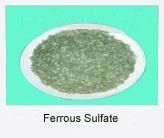Iron salts are a type of mineral iron.People often take them as a supplement to treat iron deficiency.
This article provides an overview of ferrous sulfate, its benefits and side effects, and how to use it to treat and prevent iron deficiency.
In their natural state, solid minerals resemble small crystals.The crystals are usually yellow, brown, or blue-green, so ferrous sulfate is sometimes referred to as green sulfuric acid (1).
Supplement manufacturers use many types of iron in dietary supplements.In addition to ferrous sulfate, the most common are ferrous gluconate, ferric citrate, and ferric sulfate.
Most types of iron in supplements are in one of two forms – ferric or ferrous.It depends on the chemical state of the iron atoms.

The body absorbs iron in the ferrous form better than the iron form.For this reason, healthcare providers generally consider ferrous forms, including ferrous sulfate, to be the best choice for iron supplements (2, 3, 4, 5).
The main benefit of taking ferrous sulfate supplements is maintaining normal iron levels in the body.
Doing so may prevent you from developing iron deficiency and the range of mild to severe side effects that often accompany it.
Iron is one of the most common elements on earth and an essential mineral.This means that people need to consume it in their diet for optimal health.
The body primarily uses iron as part of the red blood cell proteins myoglobin and hemoglobin, which are essential for the transport and storage of oxygen (6).
Iron also plays an important role in hormone formation, nervous system health and development, and basic cellular functions (6).
Although many people consume iron as a dietary supplement, you can also find iron naturally in many foods, including beans, spinach, potatoes, tomatoes, and especially meat and seafood, including oysters, sardines, poultry, and beef (6 ).
Some foods, such as fortified breakfast cereals, are not naturally high in iron, but manufacturers add iron to make it a good source of this mineral (6).
The highest sources of many irons are animal products.Therefore, vegans, vegetarians, and those who do not consume many iron-rich foods in their normal diet may benefit from taking ferrous sulfate supplements to help maintain iron stores (7).
Taking a ferrous sulfate supplement is an easy way to treat, prevent or reverse low blood iron levels.
Preventing iron deficiency not only ensures your body has enough of the essential nutrients to continue functioning properly, it also helps you avoid many of the unpleasant side effects of low iron levels.
Anemia is a condition that occurs when your blood has low levels of red blood cells or hemoglobin (11).
Because iron is an essential component of red blood cells responsible for transporting oxygen throughout the body, iron deficiency is one of the most common causes of anemia (9, 12, 13).
Iron deficiency anemia (IDA) is a severe form of iron deficiency that affects the body significantly and can lead to some of the more severe symptoms associated with iron deficiency.
One of the most common and effective treatments for IDA is taking oral iron supplements, such as ferrous sulfate (14, 15).
Several studies have shown that iron deficiency is a risk factor for increased postoperative complications and mortality.
One study looked at the outcomes of 730 people undergoing heart surgery, including those with ferritin levels below 100 micrograms per liter—a sign of iron deficiency (16).
Iron-deficient participants were more likely to experience serious adverse events, including death, during surgery.On average, they also required longer hospital stays after surgery (16).
Iron deficiency seems to have a similar effect in other types of surgery.One study analyzed more than 227,000 surgical procedures and determined that even mild IDA prior to surgery increases the risk of postoperative health complications and mortality (17).
Because ferrous sulfate supplements treat and prevent iron deficiency, taking them before surgery can improve outcomes and reduce the risk of complications (18).
While oral iron supplements like ferrous sulfate are an effective way to increase iron stores in the body, a person may need to take supplements daily for 2-5 months to normalize iron stores (18, 19).
Therefore, iron-deficient patients who do not have a few months before surgery to try to increase their iron stores may not benefit from ferrous sulfate supplementation and require another type of iron therapy (20, 21).
In addition, studies of iron therapy in people with anemia before surgery are limited in size and scope.Scientists still need to conduct more high-quality research on the best way for people to increase their iron levels before surgery (21).
People mainly use ferrous sulfate supplements to prevent iron deficiency, treat iron deficiency anemia, and maintain normal iron levels.Supplements can prevent the adverse side effects of iron deficiency.
Certain groups of people have an increased need for iron at certain stages of life.As a result, they are at greater risk for low iron levels and iron deficiency.Other people’s lifestyles and diets can lead to low iron levels.
People at certain stages of life have an increased need for iron and are more prone to iron deficiency.Children, female adolescents, pregnant women, and people with chronic medical conditions are some of the groups that are likely to benefit the most from ferrous sulfate.
Ferrous sulfate supplements usually come in the form of oral tablets.You can also take them as droplets.
If you want to take ferrous sulfate, be sure to look carefully for the words “ferrous sulfate” on the label rather than choosing any iron supplement.
Many daily multivitamins also contain iron.However, unless stated on the label, there is no guarantee that the iron they contain is ferrous sulfate.
Knowing the amount of ferrous sulfate to take can be tricky in some cases.Always talk with your healthcare provider to determine the dosage that is right for you.
There is no official recommendation for the amount of ferrous sulfate you should take each day.Dosage will vary based on factors such as age, gender, health, and the reason for taking the supplement.
Many iron-containing multivitamins provide about 18 mg or 100% of the daily iron content (DV).However, one ferrous sulfate tablet typically provides nearly 65 mg of iron, or 360% of the DV (6).
The general recommendation for treating iron deficiency or anemia is to take one to three 65 mg tablets per day.

Some preliminary research suggests that taking iron supplements every other day (rather than every day) may be as effective as daily supplements, or even more effective (22, 23).
Your healthcare provider will be able to provide more specific and personalized advice on how much and how often to take ferrous sulfate, based on your blood iron levels and individual circumstances.
Certain foods and nutrients, such as calcium, zinc, or magnesium, may interfere with iron absorption, and vice versa.Therefore, some people try taking ferrous sulfate supplements on an empty stomach for maximum absorption (14, 24, 25).
However, taking ferrous sulfate supplements or any other iron supplements on an empty stomach may cause stomach pain and distress.
Try taking ferrous sulfate supplements with meals low in calcium and excluding beverages high in phytate, such as coffee and tea (14, 26).
On the other hand, vitamin C may increase the amount of iron absorbed from ferrous sulfate supplements.Taking ferrous sulfate with vitamin C-rich juice or food may help your body absorb more iron (14, 27, 28).
There are many different forms of ferrous sulfate supplements on the market.Most are oral tablets, but droplets can also be used.Be sure to consult your healthcare provider before deciding how much ferrous sulfate to take.
The most commonly reported side effects were various types of gastrointestinal distress, including nausea, diarrhea, vomiting, abdominal pain, constipation, and dark or discolored stools (14, 29).
Before you start taking ferrous sulfate supplements, be sure to let your healthcare provider know if you are taking any of the following medications (6, 14):
People who take ferrous sulfate often report side effects such as nausea, heartburn, and abdominal pain.Also, iron supplements may interact with certain medications, including antacids and proton pump inhibitors.
Ferrous sulfate is safe if you take it as prescribed by a qualified healthcare provider.However, this compound – and any other iron supplements – can be toxic in large amounts, especially in children (6, 30).
Some of the possible symptoms of taking too much ferrous sulfate are coma, convulsions, organ failure, and even death (6).
Post time: Mar-14-2022




